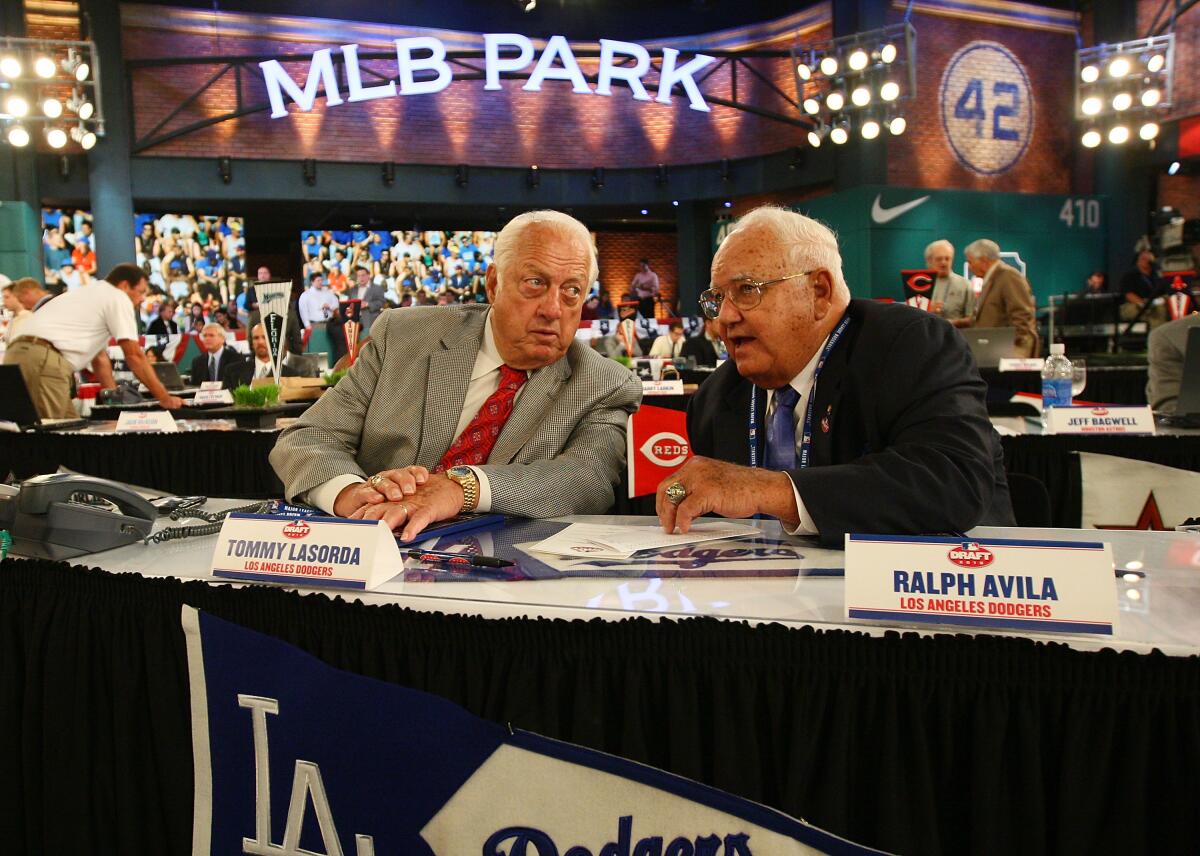Ralph Avila, who helped Dodgers develop a pipeline in Latin America, dies at 92

- Share via
Ralph Avila, an influential former Dodgers executive and scout who led the organization’s efforts to develop players in Latin America, particularly in the Dominican Republic, during his tenure from 1970 to 1999, died Monday at 92.
Avila’s son, baseball executive Al Avila, told ESPN Deportes that his father died at his home in Miami from natural causes.
Originally hired by the Dodgers as a part-time scout in 1970 after leaving his native Cuba, where he was a semi-pro baseball player, Avila became a key figure in the franchise’s operations in the Dominican Republic and other parts of Latin America.
His work helped establish a pipeline of talent that not only bolstered the Dodgers but contributed to a transformation of the major leagues as a whole, ushering in generations of big league players from Latin American countries in a trend that continues today.
Justin Turner is excited to be part of the Boston Red Sox, but the former Dodgers third baseman always will cherish what he accomplished in L.A.
One of Avila’s biggest contributions was helping to create the Dodgers’ Campo Las Palmas academy in the Dominican Republic. The academy, which opened in 1987, was the first in the Dominican to be operated by a major league team — a productive template for player development that other clubs soon followed, turning the country into the biggest hot spot for big league talent outside of the United States.
“He’s got to be classified as an institution,” former Dodgers manager Tommy Lasorda said at the time of Avila’s retirement.
Avila helped sign dozens of major leaguers during his time with the Dodgers and became a mentor to several of baseball’s biggest Dominican stars, including Dodgers pitching great Ramón Martinez (as well as his brother, three-time Cy Young Award winner Pedro Martinez), former Dodgers outfielder Raúl Mondesí, and former Dodgers infielders Mariano Duncan and José Vizcaíno.
“He was like a father figure there,” said Vizcaíno, who played 18 big league seasons and was first noticed by Avila at a tryout in his small hometown in the Dominican as a teenager.
“He’s a legend, a pioneer of baseball,” Vizcaíno added, calling Avila and Epy Guerrero, another early Dominican scout best known for his work with the Toronto Blue Jays, “the two main guys that put Dominican baseball on the map.”
Even after his retirement, Avila continued to serve in an advisory role with the Dodgers while also maintaining a presence in the Latin American baseball community.
He aided a school for disadvantaged children in the Dominican Republic called Futuro Vivo. He assisted with the Dominican Summer League and national team. He was even knighted by the Dominican president for his role in advancing baseball in the country.
“I was born in Cuba, and I’m a U.S. citizen,” Avila said in 2006. “But in the bottom of my heart, I am Dominican.”
Monday’s news struck deep for many members of the Dodgers organization, especially those in the international scouting department.
Roman Barinas, the Dodgers’ Latin America supervisor, said the staff was on a video call Monday discussing the club’s newest international signing class when they learned of Avila’s death.
“It was special for us to reminisce on that call,” said Barinas, who got his start in the Dodgers organization working at Campo Las Palmas 15 years ago. “He just understood so many different aspects of international baseball as a whole.”
Vizcaíno, who is now a special instructor in the Dodgers organization, also fondly reflected upon Avila’s legacy Monday night.
“Every single kid in the Dominican wanted to sign with the Dodgers because of Campo Las Palmas,” Vizcaíno said. “That was the first complex in the Dominican by a major league team. … And you look now, all 30 teams have an academy there.”
The Avila family name is still prominent in the major leagues. Al Avila was the Detroit Tigers’ general manager until August. Avila’s grandson, Alex, spent 13 years in the majors as a catcher before joining MLB Network as an analyst last year.
Times staff writer Jorge Castillo contributed to this article.
More to Read
Are you a true-blue fan?
Get our Dodgers Dugout newsletter for insights, news and much more.
You may occasionally receive promotional content from the Los Angeles Times.











